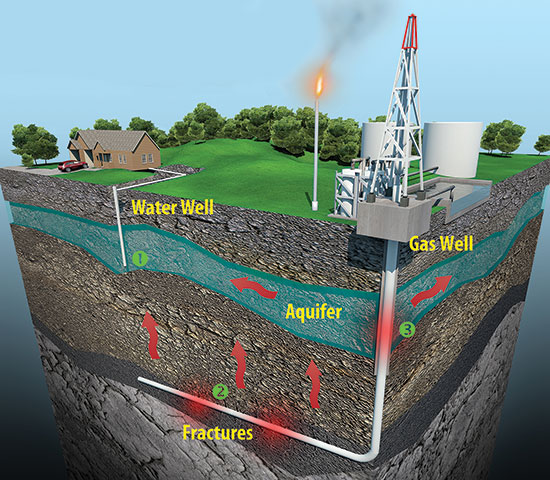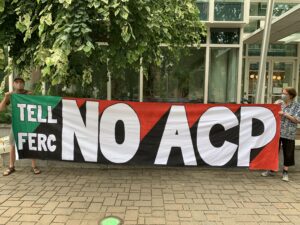Hydraulic fracturing or “fracking” is a method of extracting natural gas that involves blasting underground rock thousands of feet into the ground with a cocktail of sand, water and chemicals.
Vast underground reserves called shale basins were long thought impractical to drilling because of their depth. However, “fracking” would allow NC reserves to be processed.

What are the potential environmental and health risks?
Documented health risks (6 states with 1000 instances of groundwater contamination).
Large amounts of fresh water used and large amounts of wastewater generated with limited disposal options.
Inadequately regulated (2005 federal loophole exempting fracking from environmental regulation); spills, regulatory penalties, and litigation linked to fracturing operations have been reported in several states.
The Atlantic Coast Pipeline
The ACP was approved by the Federal Energy Regulatory Commission (FERC), in October, 2017, ignoring extensive studies on lack of need for the pipeline and major impact. Since that time, Duke Energy and Dominion Energy proved they were unable to build the unjust, unneeded Atlantic Coast Pipeline without disproportionately impacting Indigenous and African American communities along the route, destroying fragile drinking water sources, and harming endangered species throughout W.V., V.A., and N.C.
After years of challenges from the Courts, landowners, impacted communities, and ally organizations, Duke and Dominion cancelled their plans for the Atlantic Coast Pipeline on July 6, 2020!
The cancelling the Atlantic Coast Pipeline is a victory for justice of many kinds! Environmental Justice, because the African American and Indigenous communities along the pipeline route can breathe easier that this massive project that will not victimize them yet again by disproportionately harming their health, safety, economics and access to their lands. Climate justice, as the routine emissions of methane from the ACP and the fracked gas it supplied were estimated in our 2019 study to increase climate impacts by as much as 13% over EPA’s estimate of current national methane releases. Economic Justice, as ratepayers of the mega-utilities Duke and Dominion building the pipeline will not face the substantial rate hikes that the unneeded pipeline would have brought.

Landowners along the pipeline, many of very modest means, had faced losing control of their lands or long court battles, and can now settle with the rapacious pipeline builders and move on with their lives. Our only disappointment is that our NC Department of Environmental Quality accepted the grossly inadequate Environmental Impact Statement that Dominion and the Federal Energy Regulatory Commission foisted on them in 2017, and then granted air and water permits for the ACP that could not protect Environmental Justice for communities, or the state’s waters and air quality. We hope that DEQ’s leadership will realize how much of the state agency’s time and resources have been wasted on considering this misguided project, and that they will become closer partners with Environmental Justice communities and well-informed, scientific and public-spirited non-profits to protect NC communities and the public’s resources for all of us, even challenging federal “regulators” when they act as industry cheerleaders.
We celebrate with the many thousands of impacted residents, and deeply committed activists, organizations, public interest law groups and coalitions that worked relentlessly to defeat this dangerous, costly and unnecessary pipeline.
Resolutions against the Atlantic Coast Pipeline
Resolution by CWFNC
Resolutionby UNC-Pembroke


